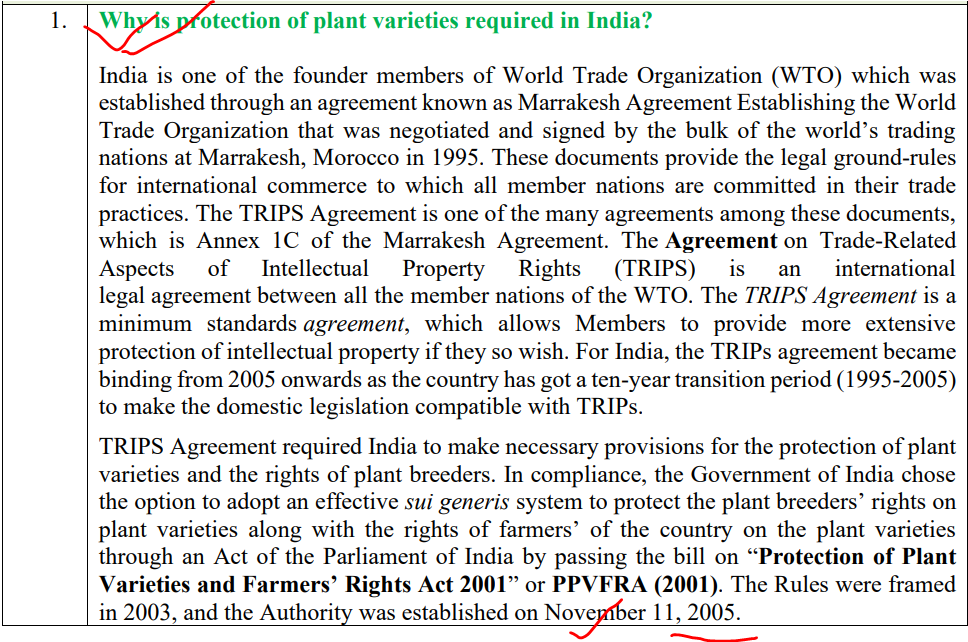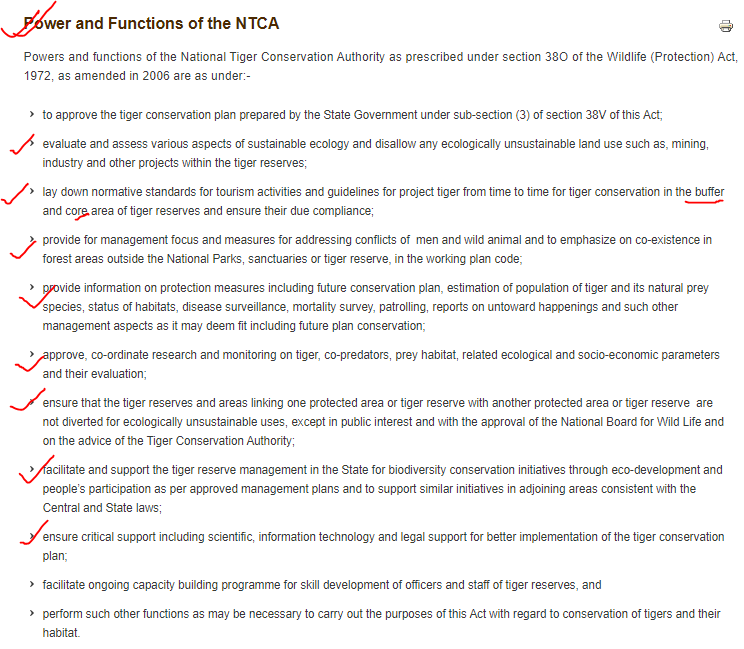Goaltide Daily Current Affairs 2023
Current Affair 1:
Protection of Plant Varieties and Farmers’ Rights (PPVFR) Act, 2001
Read below:






Protection to Farmers Against PPV&FR ACT: No need to remember what all rights are provided. Just remember, the act also provides for the rights of farmers.
The PPVFR Act, 2001 provides rights to the farmer who has bred or developed a new variety. Accordingly, she/he shall be entitled for registration and other protection as a breeder of the variety under this Act.
The rights of farmers are fully protected. As per the provision, a farmer shall be deemed to be entitled to save, use, sow, re-sow, exchange, share or sell his farm produce including seed of a variety protected under this Act in the same manner as he was entitled before the coming into force of this Act. Provided that the farmer shall not be entitled to sell branded seeds of a variety protected under this Act.
Also see:
International Treaty on Plant Genetic Resources for Food and Agriculture (ITPGRFA)
The International Treaty is the major international agreement between member countries to conserve, use and manage plant genetic resources for food and agriculture around the world for the benefit of people everywhere.
The Treaty ensures that farmers and plant breeders’ access, easily, the raw genetic material needed to develop new crop varieties, including those with higher yields and those that are resilient to climate change.
India is a contacting party.


Current Affair 2:
India and UAE have signed a pact to promote use of local currency
India and UAE have signed a pact to promote use of local currency (Rupee and UAE Dirham (AED)) for cross border transactions. It will cover all current account transactions and permitted/limited capital account transactions.
Correspondent banks are financial institutions that act as an agent on behalf of other foreign banks. Foreign banks use the services of correspondent banks when it’s not financially feasible to establish a branch in the country. For example, SBI may act as a correspondent bank for banks in UAE because UAE banks may not be willing to establish their branches in India but just want to use some services.
Mechanism:
Indian exporters will make invoices in Rupees (prices of exported items will be in Rupees) and UAE exporters (to India) will make invoices in UAE Dirham. Indian importers while making payment will transfer rupee in the correspondent bank (of UAE in India i.e., SBI) and Indian exporters will be paid in Rupee from this (SBI) correspondent bank.
As the UAE exporters (to India) are invoicing in Dirham and Indian importers are making payment in Rupee, so this will lead to development of INR-AED foreign exchange market. [Right now, only few currencies pairs trading is allowed in forex market... USD/INR, EUR/INR, JPY/INR etc.] Presently since there is no direct conversion/trading of INR-AED (Dirham) is there, so there is no market for INR-AED trade. But once this mechanism of payment starts then INR-AED foreign exchange market will develop. And then INR-AED will be easily convertible and then in future whether we are paying to (UAE exporters) in INR or AED will not make much difference as it will be freely convertible/tradable.
This mechanism will be used to pay for crude and other imports for which we are currently paying in dollars. This will also lead to promotion of investment and remittances between the two countries. It will be a step in the internationalization of rupee. This will lead to protection/hedging from exchange rate risk (Rupee-dollar price variation) and will insulate the domestic economy from global shocks.
Current Affair 3:
Cheetah mortalities at Kuno National Park point to natural causes
News:

Of the 20 translocated Cheetahs from South Africa and Namibia, five mortalities of adult individuals have been reported from Kuno National Park, Madhya Pradesh, till date. As per the preliminary analysis by National Tiger Conservation Authority (NTCA), the apex body entrusted with the implementation of Project Cheetah, all mortalities are due to natural causes.
Background:
The Project Cheetah is being implemented by National Tiger Conservation Authority (NTCA), a statutory body under Ministry of Environment, Forest and Climate Change (MoEF&CC) in collaboration with Madhya Pradesh Forest Department, Wildlife Institute of India (WII) and Cheetah experts from Namibia and South Africa.
The project implementation is being done as per the ‘Action plan for Introduction in India’ and a Steering Committee comprising of eminent experts/ officials involved in the first ever successful tiger reintroduction in Sariska and Panna Tiger Reserve, to oversee the project has also been constituted.
Under Project Cheetah, a total of 20 radio collared Cheetahs were brought from Namibia and South Africa to Kuno National Park, Madhya Pradesh, in a first ever transcontinental wild to wild translocation. After mandatory quarantine period, all Cheetahs were shifted to larger acclimatization enclosures.
Currently, 11 Cheetahs are under free ranging condition and 5 animals, including a cub born on Indian soil, are within quarantine enclosures. Each of the free ranging Cheetahs is being monitored round the clock by a dedicated monitoring team.
About NTCA:
National Tiger Conservation Authority.
The National Tiger Conservation Authority is a statutory body under the Ministry of Environment, Forests and Climate Change constituted under enabling provisions of the Wildlife (Protection) Act, 1972, as amended in 2006, for strengthening tiger conservation, as per powers and functions assigned to it under the said Act.

You will the entire function of NTCA given below. Once you read entire functions, it will give you confidence while solving questions related to this.

Current Affair 4:
Quality Control Order (QCOs)
BIS certification scheme is basically voluntary in nature. However, some Standards are made mandatory by the issuance of QCOs.
The decision to make a particular Indian Standard mandatory is essentially taken by the parent ministry dealing with the product covered under the Indian Standard (who then issues the relevant QCO making the Indian Standard mandatory). For instance, the QCO on steel products was issued by Ministry of Steel, on toys by Ministry of Commerce and Industry and on different chemicals by Ministry of Chemicals and Fertilizers.
QCO is a gazette order issued under Section 16 of the BIS Act.








